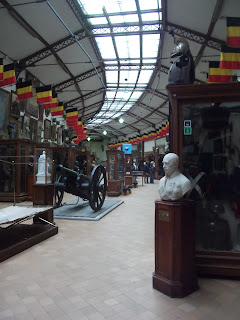Upper town:
once home to French-speaking aristocrats and royalty, this currently is the
main centre for international politics, hosting the principal EU institutions
as well as the headquarters of the North Atlantic Treaty Organization (NATO).
Palais du
Cinquantenaire – was created at the time of the exhibition of 1880 to
commemorate the fiftieth anniversary of Belgian independence. The central path of the garden leads to the
Triumph Arch which is 45 meters high and has three archways. The palace
consists of two large aisles housing museums.
Musee de l’ Armee – (museum of Army) houses numerous very
interesting army collections
Commission and council of the European community – the various
building of the European political headquarters
Institute Royal des Science naturelles – our stop for a well needed
cup of tea and then an adventure in to the Dinosaur collection
The Royal Palace – the most imposing monument within the district,
today it is the official residence of the Belgian sovereigns
Rest break – resting the worn out
feet
Mont des Arts – designed during the reign of Leopold I, it contains
a range of statues and gardens overlooking the city
Medical equipment for sale –
Eglise St-Nicolas – at
church has been on this site since the 12th Century, but much of it
was damaged in the 1695 French Bombardment
Eglise
St-Jean-Baptise au-Beguinage – this stone-clad church was consecrated in
1676 alongside the largest beguine community in the country.
Take me to a gay bar :)
- off with the parents to the gay area for a few drinks






















No comments:
Post a Comment